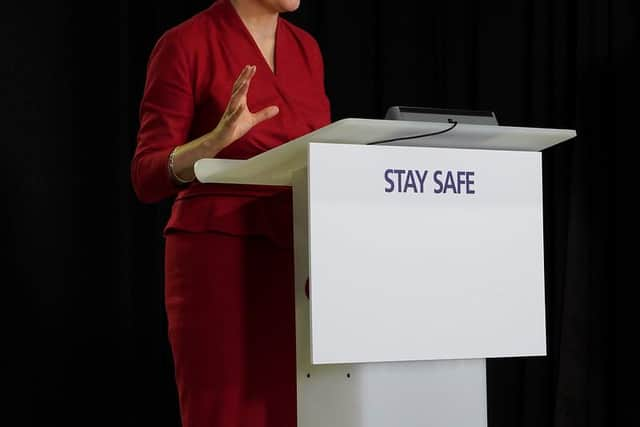Academic says Scotland should reduce 2m distancing, in line with England
Professor Hugh Pennington said the decision to reduce the distance is a political one, given how new Covid-19 is and the fact advice being given to both administrations will be “largely the same”.
Writing in the Scottish Daily Mail, Prof Pennington said should there be a localised outbreak - in a place such as a bar - when the rule is relaxed then it could simply be shut down and the rest of the population will not be impacted.
Advertisement
Hide AdAdvertisement
Hide AdBoris Johnson announced on Tuesday that social distancing will be relaxed to one-metre-plus in England from July 4 but Nicola Sturgeon said the two-metre rule will remain in Scotland for now.


The First Minister said she had asked her scientific advisers to look into reducing the amount of social distancing in certain measures, with a report expected by July 2.
The emeritus professor of bacteriology at the University of Aberdeen said there is “every reason” Scotland should also reduce the social distancing rule.
He wrote: “But in my view there is absolutely no need for (Nicola Sturgeon’s) caution.
“There is no reason we should not be following England and reducing the social distancing limit to one metre and every reason we should be in order to get the economy and education system going again.
“If we do see a localised outbreak of Covid, for example if there is an outbreak linked to a particularly busy pub, we can step in and close it down again.
“The whole country does not need to go back into lockdown.”
He added: “It is much easier to go into lockdown than it is to come out of it, as we are seeing now.
“Ms Sturgeon is getting a lot of advice right now and she is also under a lot of pressure to get Scotland moving again whilst ensuring we do not see another wave of cases.
Advertisement
Hide AdAdvertisement
Hide Ad“But what we are seeing now is not about the science, it’s about the personality and the politics.”
The microbiologist added that he believes another reason for sticking to the two-metre rule could be the First Minister’s inherent caution when making decisions about the virus.
Ms Sturgeon has repeatedly said at the daily coronavirus press briefing that caution should still be used when making decisions about Covid-19, to ensure there is not a resurgence of the virus.
Prof Pennington added: “In Scotland, although we heard yesterday that schools are set to go back full time in August, there is still no clear date for when social distancing will be eased in line with that in England.
“There is no scientific reason for this. Cases of Covid-19 are reducing in Scotland and we certainly don’t have more cases or a higher rate of infection than in England.”
A message from the Editor:
Thank you for reading this story on our website. While I have your attention, I also have an important request to make of you.
The dramatic events of 2020 are having a major impact on many of our advertisers - and consequently the revenue we receive. We are now more reliant than ever on you taking out a digital subscription to support our journalism.
Subscribe to scotsman.com and enjoy unlimited access to Scottish news and information online and on our app. Visit https://www.scotsman.com/subscriptions now to sign up.
By supporting us, we are able to support you in providing trusted, fact-checked content for this website.
Joy Yates
Editorial Director
Comments
Want to join the conversation? Please or to comment on this article.